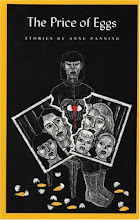I
have been thinking lately about pleasure and its complications. For example, when I eat sushi, say, or really
good Vietnamese food, I have a hard time holding back my expressions of
enjoyment. I exclaim over and over how
good it is, how fabulous and amazing.
Last summer, one of my siblings commented about my "over-enjoying"
things. "God, Anne," this
sibling said. "Why does everything
have to be such a big drama for you?
It's always, 'Oh, this is the best
barbecue chicken ever!' Or, 'This is the
most humid day ever!' Isn't anything
just normal or whatever for you? It's like everything is always totally over
the top."
I interpreted this as a criticism,
and have thought about it off and on ever since. How could the expression of
pleasure, I wondered, be considered wrong?
Or was it the extreme nature of it that was suspect? Was it embarrassing? I began to wonder why
neutrality was preferred.
Growing up in Minnesota, I was
surrounded by German Lutheran stoics. When
something good happened, say, an accomplishment like getting a 4.0 GPA in high
school, or getting a new car, you were not supposed to "toot your own
horn." I must admit I still
subscribe to that, and grow uncomfortable when someone does indeed "toot"
(myself included). Humility was valued
above all else, and drawing attention to yourself in any way was considered gauche and unseemly. Even when the good thing was something as
simple as a wonderful meal cooked, the response was still supposed to be
metered and mild—or so had been my experience.
I remember my mother standing over the hot stove making a nice meal of
calico beans, sweet corn and fried hamburger patties during hot and humid
summer evenings. She'd have a dishtowel
tossed over her shoulder to wipe away her sweat as she stood over the steaming
pots and pans. As we ate, my dad
scarfing everything down in less than two minutes, my mom would ask how it
was. I will never forget his response. "Not bad, not bad."
Where was the joy? The
pleasure? The appreciation? Or at the
very least, the recognition of goodness?
So, too, with hardship.
In Minnesota, even when someone
broke a bone or lost their job, the response was always, "Oh, it's not so
bad. Could be worse." I'll never forget my mom telling me that when
she gave birth to all four of us children, she didn't make a single sound. When I expressed shock about this, she said,
"Well, I just learned to take my pain like a woman." This statement
stuck with me, apparently, as was evidenced last week when I broke my nose.
My husband, Mark, was out of town,
so I took the kids with me to run some errands.
My college had just built a huge new fitness center, and though it was
still under construction, they invited all faculty to come and get a free pass. Why not? I thought. As we walked around the
mammoth brand new structure, I was struck by a big open air entrance out to the
stadium fields. Only it wasn't open air.
I crashed into a clear glass wall, and the pain was so intense that I can still
feel it in my stomach as I write this.
I stumbled outside. "Am I bleeding?" I asked the
kids. They said yes. The college student worker at the desk asked
if I needed a Band-Aid. "I think there might be one downstairs," she said.
"Well," I said. "I just might need something to mop up
this blood."
I started retching, got cold-hot
sweats, and my head pounded and twisted with pain. I could barely move my
jaw. And what did I do? I drove the kids home (mistake #1), didn't
call anyone (mistake #2), hung over the toilet, retching and sobbing and
bleeding, and said to the kids, "If anything happens to me, you know to
call 911, right?" (mistake #3). I heard them
silently conferring in the kitchen. Poor things.
I
was fine, I told myself. It wasn't
until three days later, after Mark returned from his trip, that I was finally
persuaded that a visit to the doctor was probably a good idea. An x-ray quickly revealed that my nose was
indeed broken.
The expression of pain, of pleasure,
is learned, not inherited. It can take years to undo lessons taught since birth.


.jpg)